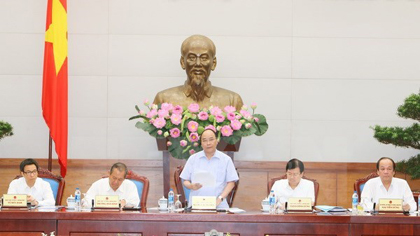Environmental protection obligatory to development process
Environmental protection should be a compulsory requirement throughout the country’s development process, stated Prime Minister Nguyen Xuan Phuc at a national teleconference on the work on August 24.
 |
| Prime Minister Nguyen Xuan Phuc speaks at the event (Photo: VNA) |
“We will not try to attract investment at any cost,” PM Phuc said, emphasizing the environmental criterion in choosing investment projects.
It is time to change the way of thinking towards attaching economic growth with environmental protection for sustainable development, he said.
Environmental protection is no longer an issue of the future, but the present. Therefore, it is essential to have both short-term and long-term solutions, the PM stated, adding that sustainable environment can help Vietnam stay firm in the global production value chain, he added.
The Government leader noted that the heads of people’s committees at all levels should take the responsibility for the environmental protection work in their localities.
He asked for closer coordination between ministries, agencies and localities in implementing the work.
Praising several localities’ refusal of projects that can cause pollution, the PM assigned the Ministry of Natural Resources and Environment (MoNRE) to supervise the enforcement of environment-related laws and promote the efficiency of operations of environment polices.
The ministry was also urged to build a set of criteria to assess the environmental protection in localities from 2017.
The leader requested the building of environmental protection monitoring systems in key economic zones and environmentally sensitive areas.
He assigned relevant ministries and agencies to research the establishment of an emergency response committee.
The Government will issue a direction on environmental protection, he added.
Minister of Natural Resources and the Environment Tran Hong Ha told the meeting that many investors as well as local governments, economic organisations and the public lack the awareness and sense of responsibility about environment protection, which is reflected in the emphasis on economic benefit at the cost of the environment.
The Ministry of Natural Resources and the Environment submitted a report, which said there are more than 2,000 investment projects that need to make reports on their impact on the environment.
The country is currently home to 283 industrial zones which discharge over 550,000cu.m of wastewater per day, not to mention 615 industrial clusters along with over 500,000 production facilities.
Furthermore, 787 urban areas discharge into the environment 3 million cu.m of wastewater per day, but only 40 out of the urban areas have standard waste treatment systems with a total capacity of 800,000cu.m per day.
The use of nearly 43 million motorbikes and over 2 million cars nationwide generate huge gas emission that is polluting the air environment.
Over 23 million tonnes of domestic waste, 7 million tonnes of industrial waste, and 630,000 tonnes of harmful waste, together with 337 insanitary landfills and over 100 low-capacity incinerators are also the reasons for environmental pollution.
Besides, discarded packaging from around 100,000 tonnes of plant protection chemicals each year is another source of dangerous pollutants.
The report noted that although FDI businesses are contributing 70 percent of the country’s GDP, they are tending to shift their investment into environmentally-unfriendly sectors such as metallurgy, ship repairing, footwear and garment.
(Source: VNA)
 về đầu trang
về đầu trang







